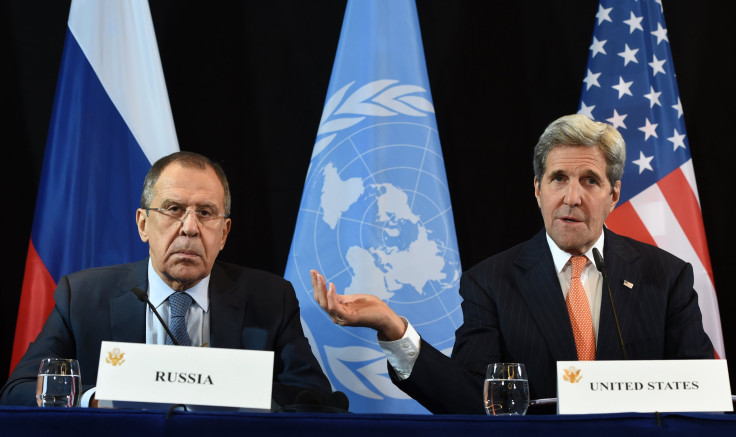Russian Airstrikes In Syria To Continue As Plan For ‘Cessation Of Hostilities’ Did Not Apply To ISIS, Other Terrorist Outfits

Russia will not halt airstrikes in Syria as the plan to implement a “cessation of hostilities” did not apply to the Islamic State group, also known as ISIS, and other terrorist organizations in the war-torn region, Russian Foreign Minister Sergei Lavrov said Friday. Lavrov’s comments came as British Foreign Secretary Philip Hammond said that a ceasefire in Syria will only succeed if Russia stops its airstrikes supporting Syrian government forces' advance against the opposition.
International officials meeting in Munich late Thursday proposed a plan to end the violence in Aleppo, Syria, and help those fleeing the area. The plan was put forward by members of the International Syria Support Group, a coalition of 17 countries that came together in 2014 to find a way to stop the yearslong crisis in the country. The discussions, however, did not include the Syrian regime or the Syrian opposition.
Following the meeting, Lavrov reportedly said that peace talks should resume in Geneva as soon as possible and that all Syrian opposition groups should participate. However, he added that Russia’s “airspace force will continue working against” organizations such as ISIS and al Nusra, which is affiliated with al Qaeda.
In a statement Friday about the plan calling for an immediate ceasefire in Syria, U.K.'s Hammond reportedly said: "If implemented fully and properly ... this (deal) will be an important step toward relieving the killing and suffering in Syria. ... But it will only succeed if there is a major change of behavior by the Syrian regime and its supporters.
"Russia, in particular, claims to be attacking terrorist groups and yet consistently bombs non-extremist groups including civilians. If this agreement is to work, this bombing will have to stop: no cessation of hostilities will last if moderate opposition groups continue to be targeted,” Hammond added.
A senior French diplomat also warned that Russia would be taking a political risk with its decision to continue airstrikes.
"The Russians said they will continue bombing the terrorists. They are taking a political risk because they are accepting a negotiation in which they are committing to a cessation of hostilities. If in a week there is no change because of their bombing, then they will bear the responsibility," the diplomat said, according to Reuters.
Turkey's Foreign Minister Mevlüt Çavuşoğlu reportedly called the plans for a ceasefire in Syria an "important step" but urged an end to the airstrikes in the war-torn area.
The crisis in Syria’s Aleppo province has escalated amid a surge in fighting in the region as the government began an attempt to recapture the city from rebels.
Russia has claimed that its airstrikes in Syria are aimed at destroying terrorist strongholds, including that of the ISIS. However, several Western countries believe that the offensive is targeted at eliminating opposition groups fighting the regime of Syrian President Bashar Assad, a close ally of Russia.
Syria's main opposition group welcomed the ceasefire plan by the world powers Friday, spokesman Salim al-Muslat said, according to the Guardian. However, the group cautioned that it would join political talks with government representatives in Switzerland if the agreement proves to be effective.
"If we see action and implementation, we will see you very soon in Geneva," al-Muslat reportedly said.
As part of the plan, major powers, including the United States, Russia and more than a dozen other nations, agreed to help provide rapid humanitarian access to besieged Syrian towns. In the next week, it will be confirmed whether Syria's government and opposition forces are ready to provide access denied for so long.
“Humanitarian access to these most urgent areas will be a first step toward full, sustained, and unimpeded access throughout the country,” the statement issued by the International Syria Support Group read, according to the Guardian. “The cessation of hostilities will commence in one week, after confirmation by the Syrian government and opposition, following appropriate consultations in Syria. During that week, the ISSG taskforce will develop modalities for the cessation of hostilities.”
© Copyright IBTimes 2024. All rights reserved.




















